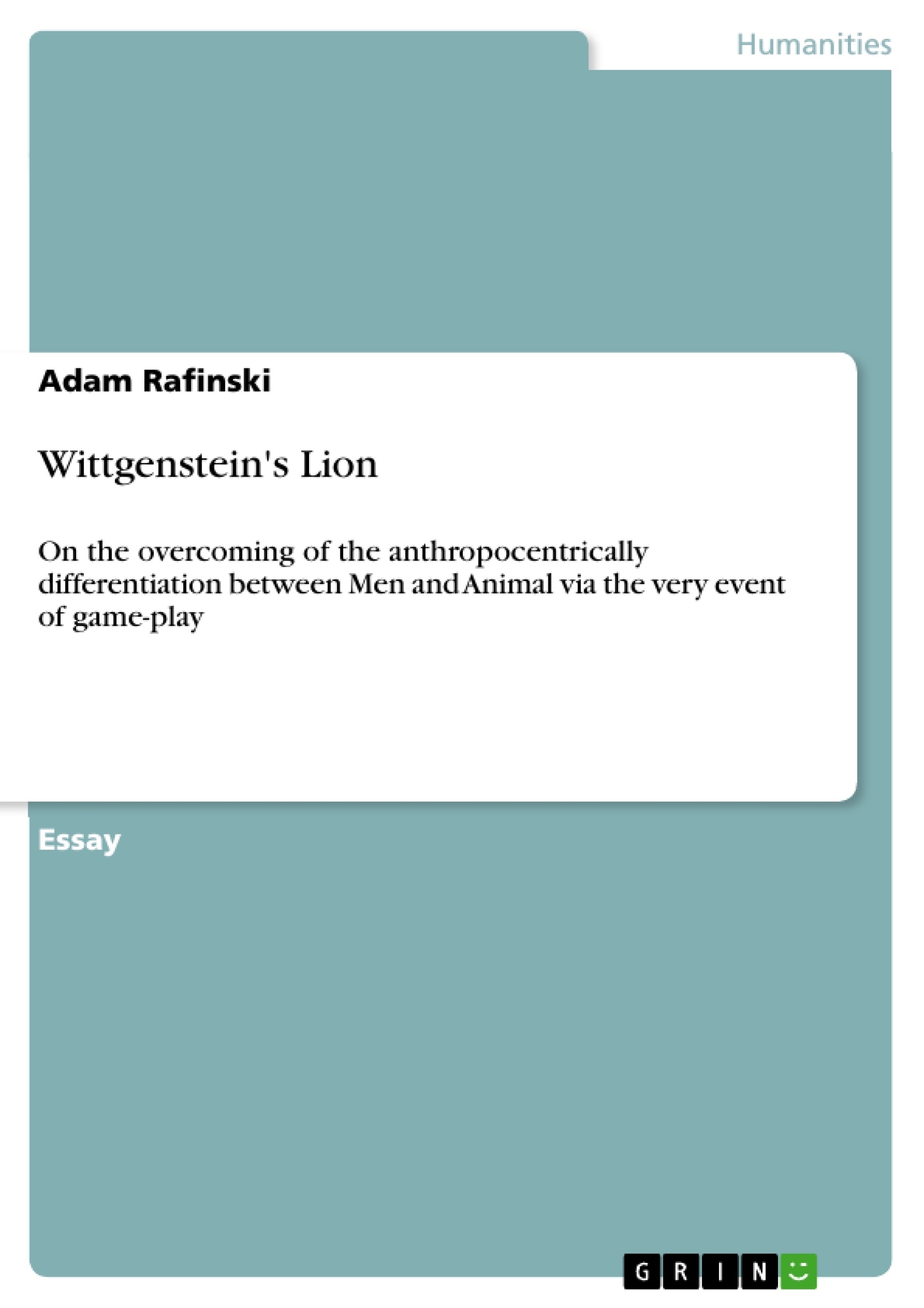“If a lion could talk, we could not understand him.” (Wittgenstein 1958, P. 223)
Conducted by this famous quote from Ludwig Wittgenstein, this paper concerns the anthropocentrically gap between Men and Animal in two parts:
The goal of first part, entitled "Wittgenstein's Lion speaks", is to throw a spotlight on this dark phrase regarding its meaning, possibility and actual consequence for the philosophical relationship between the animal and the human today. I will begin by posing the question of the meaning of this event. By analyzing the use of the metaphor of the lion I will ask for the content of his speech. Then I will ask for the possibility of the lion giving this speech after the death of truth. But before that, I will also raise the question of the ontological difference between animal and man. And finally I will conclude by raising the question in which form his words would appear to us today.
The goal of the second part, entitled "Wittgenstein's Lion at play", will be to call into question a theory of language that deals with the notion of game-play as a possibility to overcome the anthropocentric gap under the onto-metaphysical condition that I already extracted in the first part. Although I am very aware that what follows might overstretch some ideas by Wittgenstein a little bit, I have to give my strong suspicion concerning the relationship between Wittgenstein’s “language-game” and his “form of life”, as a ideal starting point to leave our anthropocentric prison of reason, some space. Taking the thoughts of one of the most ambitious logical thinker in the age of posthistoire literally, I will have to give Wittgenstein’s ideas some “form of life” by doing exactly what his theory of language calls for: by playing with it in a close reading.
Inhaltsverzeichnis (Table of Contents)
- I. The very event of revolution
- II. The speaking animal and his World in the age of posthistoire
Zielsetzung und Themenschwerpunkte (Objectives and Key Themes)
This paper examines the meaning and implications of Wittgenstein's famous statement: "If a lion could talk, we could not understand him." The paper explores the statement's connection to Nietzsche's concept of the "Superman" and the lion's role in the death of God. It then analyzes the ontological difference between animals and humans, considering Rilke's notion of the animal's relation to the "Open" and Heidegger's concept of "Dasein."
- The meaning of Wittgenstein's statement and the metaphor of the lion.
- The role of the lion in Nietzsche's concept of the "Superman" and the death of God.
- The ontological difference between animals and humans.
- The animal's relation to the "Open" in Rilke's poetry.
- Heidegger's concept of "Dasein" and the implications for understanding the animal.
Zusammenfassung der Kapitel (Chapter Summaries)
I. The very event of revolution
This chapter examines the meaning of Wittgenstein's statement about the lion. It explores the connection between the lion and Nietzsche's concept of the "Superman," specifically the lion's role in the death of God. The lion represents a moment of pure will, a revolution that transcends established values and creates new ones.
II. The speaking animal and his World in the age of posthistoire
This chapter discusses the possibility of the lion speaking after the death of God. It examines Rilke's concept of the "Open," an endless area of being that animals have access to, but humans do not. The chapter explores how the animal's lack of a "World" allows it to perceive and interact with the "Open" in a way that humans cannot. It also considers Heidegger's ideas about "Dasein" and the ontological distinction between animals and humans.
Schlüsselwörter (Keywords)
This preview focuses on key themes such as the ontological difference between humans and animals, the death of God, Nietzsche's concept of the "Superman," Rilke's notion of the "Open," and Heidegger's concept of "Dasein." These terms are central to understanding Wittgenstein's statement about the lion and its implications for our understanding of the relationship between humans and the animal world.
Frequently Asked Questions
What did Wittgenstein mean by 'If a lion could talk, we could not understand him'?
This famous quote highlights the anthropocentric gap. Wittgenstein suggests that even if an animal used our language, their 'form of life' and worldview would be so different that their meanings would remain inaccessible to us.
How does Nietzsche's 'Superman' relate to the lion metaphor?
The lion represents a stage in Nietzsche's transformation of the spirit. It symbolizes the 'sacred No' and the power to create new values after the death of God.
What is Rilke's concept of the 'Open'?
Rilke describes the 'Open' as an endless area of being that animals have access to because they lack the human 'prison of reason' and structured world-view.
How does Heidegger define the difference between humans and animals?
Heidegger uses the concept of 'Dasein' to distinguish human existence. He famously stated that the animal is 'poor in world' while the human is 'world-forming'.
Can 'Language-Games' bridge the gap between species?
The paper explores whether Wittgenstein's 'language-games' and 'forms of life' provide a starting point to leave our anthropocentric prison and understand non-human existence through 'play'.
- Quote paper
- Adam Rafinski (Author), 2009, Wittgenstein's Lion, Munich, GRIN Verlag, https://www.grin.com/document/129741



